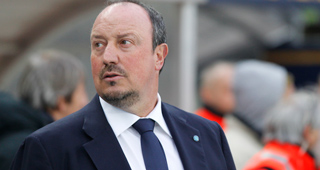“You gave us the best years of our lives”, the sign read during Rafa Benitez’s final match as Real Madrid manager. The 2-2 draw took place against Valencia at the Mestalla, against the club he managed to two La Liga titles at the turn of the century. With tensions rumored from the start, and especially heightened since the loss to Barcelona back in November, it was a gesture to remind audiences that Benitez is a title winning manager. And after getting fired from his boyhood club, at least there’s another place he can call home.
It was a swift decline. Just three months ago, Real Madrid were flying at the top of the table with ruthless efficiency. They’d only given up four goals through their first 10 matches, and hadn’t lost until a tense match against Sevilla the following week. But that blip could not have foreshadowed the aftermath of the match two weeks later against Barcelona.
Barcelona won 4-0 at the Bernabeu in historic fashion. The only consolation is that Gerard Pique didn’t get a chance to score the fifth. It was difficult to imagine a worse outcome for Benitez, who was always seen as second fiddle to Carlos Ancelotti. Regardless of style or sensibility, Benitez could prepare a balanced side, but even that most basic trademark failed as Andres Iniesta and Sergio Busquets passed around an invisible Real Madrid midfield. Embarrassed after 90 minutes, there was only one inevitable ending to Benitez’s time with the club.
No league does white space like La Liga, with invisible forces tipping the scale of Barcelona and Real Madrid hegemony one way or another. Benitez was not solely to blame for the result. Yes, he was referred to as the stepfather no one wanted, but there was sympathy in the acknowledgement that the side did not play like a Benitez team (he’s a very good organizer of midfielders and defenses at the very least, and their starting three of James Rodriguez, Toni Kroos, and Luka Modric was missing something without the ball). Supporters chanted for Florentino Perez’s resignation. What was left unspoken rang louder. There was the scoreline of the match, then there was Benitez’s impossible situation that his lineup revealed.
The team didn’t play poorly for the next three months. They had scoring flourishes, hitting eight against Malmo in Champions League and 10 against Rayo Vallecano. Going into Benitez’s final match against Valencia, the side had outscored their opponents 19 to five in league matches following El Clasico. He was fired the following Monday.
Benitez’s managerial career began with Real Madrid’s B team in 1993. Over the next 23 seasons, he managed 961 games with 11 clubs in three different countries, winning 12 medals. Never placed in the highest tier of manager, his career is either underappreciated or he’s underwhelmed. There is a hard beauty when his sides are hitting on all cylinders exemplified through his work with metronomes Ruben Baraja and Xabi Alonso (if there was a player that embodied his vision, it’d be something of a combination of Javier Mascherano and Alonso - smart, technical, and tactical).
There was something about his sides at Valencia and Liverpool. How we view the gulf in talent between the 2005 Liverpool team and their Milan counterparts in the Champions League finals increases every year. Yet Benitez, through some combination of tactics and luck, a midfield of Didi Hamann, Vladimir Smicer and Alonso somehow stifled Andrea Pirlo, Kaka, and Clarence Seedorf and Crespo that night. Likewise, many of those mid-2000s Liverpool Champions League matches are distinguished more by functionality and tension than skill.
I often go back to Michael Cox placing Benitez’s Valencia side as the 11th best team of the 2000’s. It may seem a memory now but Benitez pushed the modern game forward as much as any manager at the time. Four distinct lines in a genuine 4-2-3-1. Playing three versus two in the center of midfield to keep possession. Both the attacking and back four protected by an intelligent duo in Ruben Baraja and David Albelda. The strains of what the game looks like today, or at least looked like, are there. Of course, something that worked in 2001 isn’t expected to be the timeless approach.
There was a theory posited on Twitter that Pep Guardiola’s Juego de Posicion made a reactive approach like one that defined Benitez, obsolete in some form (although the comment was aimed towards Jose Mourinho’s struggles at Chelsea this season). If Guardiola is the constant innovator, then Benitez could have seen as having innovated once, then other managers caught up and surpassed.
It is appropriate that Mourinho and Benitez struggled in the same season, as each manager are strangely linked throughout the years. There was a time in 2005 when it was thought that Mourinho’s Chelsea and Benitez’s Liverpool would shape the Premier League for years to come (the same article foreshadows ten years in advance why Benitez would never work at Real Madrid). Benitez then directly followed Mourinho at Inter and was the caretaker manager of Chelsea before the latest connection at Real Madrid. Mourinho is rumored to take over the likes of Manchester United, while Benitez, well...
Paco Lloret, Benitez’s biographer, recalled how no one in Spain could believe how good of a manager he became at Liverpool. The biggest challenge for Benitez at the time was going from being a champion in Spain to learning a new language, culture, and style of play. Yet he wanted to show he could be succeed where no Spanish manager had ever done. The challenge this time around is existential - how does one succeed in soccer today with the likes of Barcelona and Bayern Munich setting the pace? His tactics at Valencia that made him successful were in large part reactionary, aimed to close off space without the ball. The idea remains the same 15 years later. But it may be one step too far for Benitez this time around.



